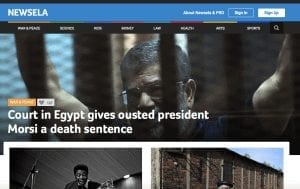Student access to relevant information and news continues to expand with technology advancements. I had the opportunity to interview Matthew Gross, CEO and co-founder, of Newsela. The Newsela team brings students current events and news aligning with current standards expected in today’s classroom.
Dr. Berger: It seems pretty clear that Newsela met a need in the education market by the overwhelming response. What were the conditions, in your estimation, that set the variables in motion to create the space you filled with the Newsela solution?
Matthew Gross: Most education software is terrible. It represents an effort to take the centuries-old textbook model and put it online. Software that teachers and students use in school should be as good or better than the software they use for everything else in their lives. Same goes for the things they read. The shift is to focus more student reading on nonfiction that helps them understand, participate and be ready for the world they will inherit.
Teachers don’t have the tools that they need to make the best decisions for their students. Too much software tries to replace the teacher’s professional judgment and expertise — when software tries to automate the art of teaching, it fails miserably. Empowering teachers is where it’s at.
DB: Many have feared the “mighty” and sometimes mythical creature of educational publishing given their stronghold on the market. How did you and your team think about the market, the disruption you would ultimately create and the aftermath of a successful launch?
MG: The fact is that publishers don’t have a stronghold on the market. Districts I visit across the country are putting textbook adoptions on hold or scrapping them altogether. Less than half of the money schools spend on instructional materials goes into textbooks, and that number is going down, purchase order by purchase order. We’re living in an era when every century-old industry is being reinvented for the digital age. In five or 10 years, the biggest education companies in the world will be ones that didn’t exist five or 10 years ago.
DB: Following up, do you find that the textbook publishers, who I might add are very quickly trying to reinvent themselves in the digital age, are nervous about the impact Newsela is having in a world where we are constantly questioning the shelf life of textbooks?






We see students reading Newsela articles and being inspired to take action in their communities. They’ve written letters to President Obama about the use of drones. They got a Johns Hopkins engineer they read about in Newsela to make a 3-D printed prosthetic hand for one of their teachers. That only happens when the education experience really reaches students on their terms.
DB: We are seeing a vested interest from schools, students and innovators to provide enough runway for self-publishing to be impactful in learning environments. Do you ever envision a day where student users of your solution are able to publish responses to what they are reading and learning?
MG: Of course, we know from our own analysis that students who actively engage with the text comprehend more and perform better on our quizzes. That’s why we introduced Write and Annotations last year.
Write provides thought-provoking prompts, or teachers can create their own, so students can write about what they’re reading. It encourages close reading and critical thinking, and will keep getting better and better with even more input from teachers.
Annotations help make students’ thinking visible and allow for a collaborative dialog with the teacher about what students are reading. Student annotations give teachers tremendous insight into each student’s understanding of the text.
DB: Let’s talk a little bit about school-based leaders who often are tasked with choosing technology for their classrooms. How do they initially respond to Newsela and what do they see as the greatest value proposition?
MG: When school leaders look at Newsela they often comment on three things:
DB: What’s next for Newsela?
MG: In the short term, we’ll continue to roll out high-quality, high-interest content and features that teachers have come to expect, like Text Sets, a collaborative feature to allow teachers to create their own collections of articles that engage and inspire their students. Most recently, we launched 99 Text Sets for Literature which are collections of news articles pertaining to the different themes and topics found in the most cherished and widely read fiction books, like “1984”, “The Adventures of Huckleberry Finn” and “Lord of the Flies”.
We will also be launching Newsela en Español which lets teachers and students switch between English and Spanish versions of articles and quizzes, and Newsela Elementary, which has news tailored for younger students. And we’re very excited to be releasing iOS and Android apps to make Newsela even more accessible for students on phones and tablets.
In the long term, our mission is to unlock the written word for everyone. And we won’t stop until we do.
Matthew Gross is the CEO and co-founder of Newsela. Gross has a nineteen-year career in the education sector, for-profit and nonprofit entrepreneurship, and product development and distribution. Matthew began his career as a Teach for America corps member, teaching music at C.S. 50 in the South Bronx. He serves on the Board of Generations Schools Network and the School Leadership Team of P.S. 101 in Queens, which his three boys attend. He holds a B.A. from Columbia University.
Original story courtesy of Dr. Berger’s “Down the Hall” column on Scholastic District Administrator